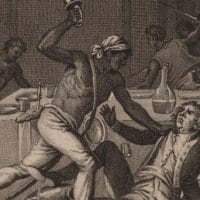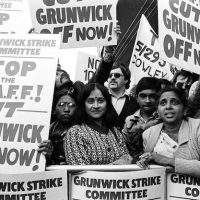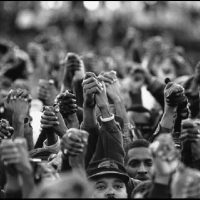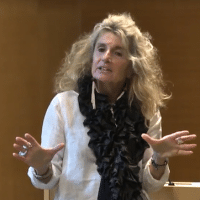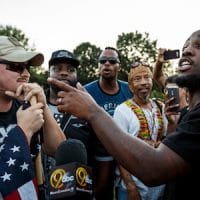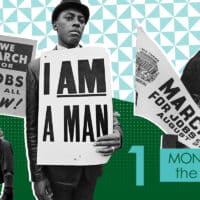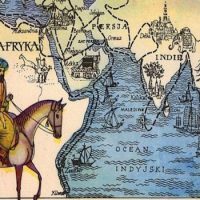-
Boots Riley’s critique of Spike Lee’s “BlacKkKlansman”
Sorry to Bother You director and musician Boots Riley on Spike Lee’s, BlacKkKlansman: “It’s a made up story in which the false parts of it to try to make a cop the protagonist in the fight against racist oppression. It’s being put out while Black Lives Matter is a discussion—and that is not coincidental. There is a viewpoint behind it.”
-
Black workers and immigrants: borrow a page from Marx
Tom Broadwater, a brother, recently wrote a commentary titled “Democrats’ Immigration Dogma is Damaging African American Communities.” It appeared in the Afro American newspaper and in Newsweek.
-
Fascist mob storm socialist bookshop in broad daylight
About a dozen fascists stormed into the bookshop close to the shop’s closing time, attempting to intimidate staff and customers as they destroyed books and materials.
-
Racism and the logic of capitalism
The emergence of a new generation of anti-racist activists and thinkers battling police abuse, the prison-industrial complex and entrenched racism in the US, alongside the crisis over immigration and growth of right-wing populism in Europe and elsewhere, makes this a crucial moment to develop theoretical perspectives that conceptualise race and racism as integral to capitalism while going beyond identity politics that treat such issues primarily in cultural and discursive terms.
-
A nasty witch and apes—not from Oz
Even little victories are rare in the East German industrial landscape. But it is always worthwhile to oppose evil witches and even defy autocrats wearing golden caps full of diamonds and rubies.
-
The relationship between racism and capitalism
Revulsion is building towards the smokescreens of hypocrisy, racism, and nationalism barely masking capitalism’s ongoing failure to provide the jobs and incomes people need.
-
The New Postcolonial Economics with Fadhel Kaboub
In this episode, we speak with Fadhel Kaboub (@fadhelkaboub), associate professor of economics at Denison University and President of the Global Institute for Sustainable Prosperity. Fadhel outlines a new critical approach to postcolonial political economy, arguing that re-gaining financial sovereignty is a crucial next step for postcolonial nations hoping to achieve social, economic, and environmental justice.
-
The Texas counter-revolution of 1836
This is a spot-on history of the birth of the American empire. But beyond recounting the regional and national events celebrated on the monument, re-viewing the Texas revolution in a world-historical perspective offers a far more insightful understanding of the conflict that occurred in northern Mexico in the 19th century.
-
Race, gender and social reproduction in British capitalism, 1945-78
How can we understand the way that capitalism comes to be gendered and racialised?
-
Times up for Capitalist Patriarchal Racism—and not just for the men who perform it
As we head into the 2018 elections feminists of all sorts must make sure that there is a revolutionary commitment to restructure the massive system of oppression maintained by sexual violence. Becoming a part of the existing structure is not enough—nor is simply being female.
-
Upholding black radical internationalism
A wise person said being attacked by one’s enemies means you have become effective. Events over the last weekend at the Left Forum in New York City prove the Black Alliance for Peace (BAP) is now seen as a threat, making our 1-year-old organization a target.
-
Confronting Cinema’s Fascist Unconscious with Maxximilian Seijo
In this episode, Money on the Left cohost Maxximilian Seijo (@maxseijo) expands upon the argument made in his video essay, “Inglorious Basterds: Nazi Desire Fully Employed,” which takes a neochartalist lens to Quentin Tarantino’s Inglorious Basterds (2008).
-
Zillah Eisenstein and Damayan: race, gender and socialism
Zillah Eisenstein is one of the foremost political theorists and activists of our time.
-
Sunday hits at racists
Organizers of the far-right AfD hoped to get 10,000 adherents for a march on Sunday in Berlin, but their ranks were far thinner, even with buddies from openly pro-fascist gangs. After distributing a thousand or more big German flags, they joined ranks and set off on their anti-foreigner, anti-Islam, anti-leftist Berlin crusade.
-
How identity politics has divided the left: an interview with Asad Haider
Identity politics has something for everyone—but not in a good way. In her 2016 election campaign, Hillary Clinton invoked “intersectionality” and “white privilege” as a shallow gesture of allyship to young liberal voters.
-
Job Guarantee as Historical Struggle with David Stein
In our inaugural episode, we consider the recent resurgence of full employment politics in the United States from both a political and historical perspective with historian David Stein (@davidpstein).
-
Reflections on the Pan-Afro-Asiatic civilizational complex
The encroachments of European traders, missionaries, explorers, planters, soldiers, and especially scholars and teachers, represented not civilization but rather, its antithesis.
-
The whitesplaining of history is over
When the academy was the exclusive playground of white men, it produced the theories of race, gender, and Western cultural superiority that underwrote imperialism abroad and inequality at home. In recent decades, women and people of color have been critical to producing new knowledge breaking down those long-dominant narratives. Sociological research confirms that greater diversity improves scholarship.
-
Recast(e)ing the model minority: Behind right wing Hindu politics in the U.S.
Indian Americans’ susceptibility to conservative politics in the U.S. is itself a contradictory affair—on the one hand they have largely voted Democrat, but have publicly remained ambivalent about racial politics in the country. One key element of this ambivalence is the question of affirmative action and meritocracy.








